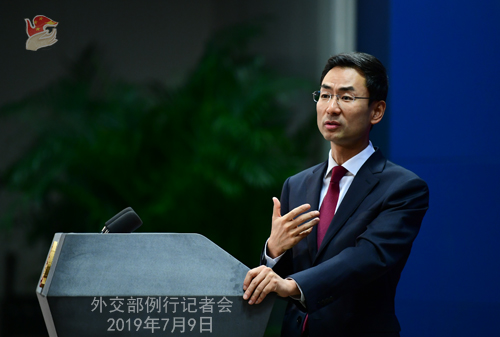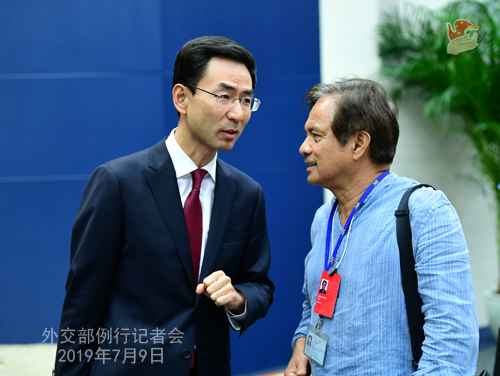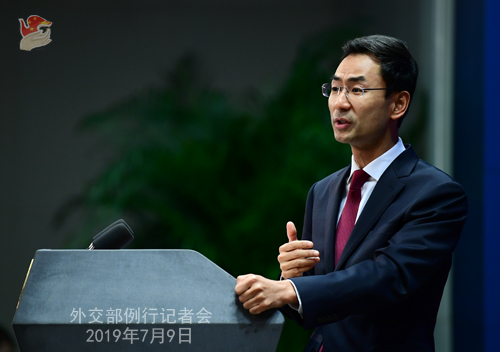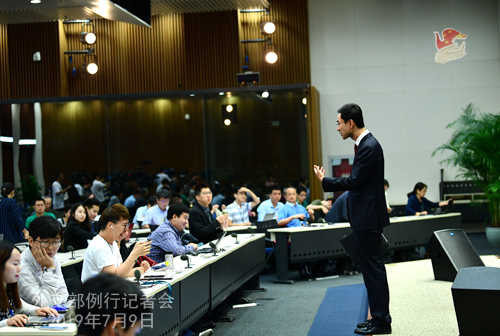| Foreign Ministry Spokesperson Geng Shuang's Regular Press Conference on July 9, 2019 |
| 2019-07-09 18:42 |
|
Q: The US State Department has approved a $2.2 billion arms sale package to Taiwan. Has the Chinese government already complained to the US about this? A: The US arms sale to Taiwan gravely violates international law and basic norms in international relations, seriously breaches the one-China principle and the three China-US joint communiques, flagrantly interferes in China's domestic affairs and harms China's sovereignty and security interests. China deplores and resolutely opposes it. We have lodged stern representations with the US. Taiwan is an inalienable part of the Chinese territory. No one should underestimate the Chinese government and people's will and resolve to defend our sovereignty and territorial integrity against foreign interference. We urge the US to stay committed to the one-China principle and the three joint communiques, cancel this arms sale immediately and stop military ties with Taiwan to prevent further damage to China-US relations and peace and stability across the Taiwan Strait. Q: Recently Japan stopped supplying semi-conductor materials to ROK businesses. What's China's comment on Japan's trade sanctions measures? A: We note the reports. As the world is challenged by unilateralism and protectionism, we hope Japan and the ROK will solve relevant issues through dialogue and consultation on the basis of mutual respect, equality and mutual benefit. Q: Hong Kong's Chief Executive Carrie Lam said today that the extradition bill is "dead" although she stopped short of a formal withdrawal. Was this position discussed with Beijing? Does Beijing support the Hong Kong government in this position? A: China's Central Government supports, respects and understands the SAR government's decision on June 15 to suspend work on the amendment bill. I have nothing further to add. Q: Media reported that China's Ministry of Transport recently issued a notice raising the security level of Chinese ships sailing through the Strait of Malacca to level three. There is word that China will send warships there to escort Chinese ships. Can you confirm that? A: I took a relevant question last week. The Ministry of Transport issued the notice pursuant to provisions of relevant international conventions and domestic laws and regulations. It is aimed at preparing for possible risks and ensuring safe passage. As to sending warships to escort Chinese ships, that is nothing but rumors fabricated out of thin air.
Q: The Swedish high court has just decided about half an hour ago that they would not allow the extradition of Qiao Jianjun to China and the reason they gave is concerns about possible mistreatment and human rights problems in China. What's your response? A: I took a similar question yesterday. We hope the Swedish government and Supreme Court will bear in mind the facts of his crimes and extradite him back to China for trial. By so doing, they will uphold fairness, justice and the dignity of rule of law, and prevent Sweden from becoming a safe haven for criminals. Regarding the so-called reason given by the Swedish Supreme Court, I would like to point out that China attaches high importance to protecting and promoting human rights and the Chinese judicial system effectively safeguards the legal rights of criminal suspects. The progress of China's human rights protection in the judicial field is there for all to see. And over 260 criminal suspects from Europe, Asia, Africa and Latin America have been extradited back to China. This fully testifies to the international community's confidence in China's judicial system. We again urge the Swedish side to treat China's request seriously. Q: First question, US Vice President Pence and Secretary of State Pompeo discussed the autonomy of Hong Kong and other issues with Jimmy Lai, founder of Next Digital. What is your comment on that? Second, at invitation, Hong Kong singer Denise Ho made a speech on the demonstrations against the Fugitive Offenders Ordinance in the UN Human Rights Council yesterday. She was interrupted twice by a Chinese delegate. Does this indicate that the Central Government does not allow people from Hong Kong to make statements against the mainland's position on international occasions? A: On your first question, as we said repeatedly, Hong Kong affairs are purely domestic. They brook no interference from any country, organization or individual. It is wrong for any external forces to interfere in Hong Kong affairs in whatever form. Any attempt to incite chaos in the SAR by hyping up this issue has no support and will not succeed. By repeatedly interfering in Hong Kong affairs, the US has sent seriously wrong signals to the world. We deplore and firmly oppose that. We urge the US to respect China's sovereignty and the rule of law in Hong Kong, exercise caution in its words and deeds, stop its interference and do not engage in anything that may undermine Hong Kong's prosperity and stability. On your second question, first, Hong Kong is China's special administrative region, and its affairs are purely domestic. They brook no interference from any country, organization or individual. Second, certain non-governmental organizations violated relevant provisions of the UN Charter and rules of the Human Rights Council, challenged the one-China principle, interfered in China's sovereignty and internal affairs, and smeared China's human rights condition. China strongly opposes and condemns that. Third, since the return of Hong Kong, policies including "one country, two systems", "Hong Kong people governing Hong Kong" and a high degree of autonomy have been earnestly carried out. Hong Kong people's rights and freedoms have been fully guaranteed. Those are unquestionable facts. A prosperous and stable Hong Kong is good for China and the world.
Q: Jimmy Lai is the chief of the biggest media group in Hong Kong. In China's opinion, why did the US officials meet with him? What consequences might there be if the US government gets closer to Hong Kong media? Second question, Denise Ho called on the UN to remove China from the Human Rights Council. What is your response to that? Third question, will the frequent meetings between US officials and people from Hong Kong negatively impact China-US trade consultations and China-US relations? A: On your first question, you know better than I do who Jimmy Lai is. By meeting with him, the US politicians have sent seriously wrong signals to the world. We deplore and firmly oppose that. We urge the US to respect China's sovereignty and the rule of law in Hong Kong, exercise caution in its words and deeds, stop its interference and do not engage in anything that may undermine Hong Kong's prosperity and stability. On your second question, Denise Ho's so-called "removal" is nothing more than a pipe dream. I'm afraid she may be too sure of herself. On your third question, we have made stern representations to the US side and made clear our solemn position against its Hong Kong-related, erroneous words and deeds. We urge the US to bear in mind China's concerns and stop any further attempts to interfere in Hong Kong affairs and China's internal affairs. Q: It has been reported that yesterday under the mediation of the Norwegian government, Venezuela's government and opposition held the third round of talks in Barbados. Could you comment on that? A: China's position on the Venezuela issue is consistent and clear. It should be resolved by the government and opposition through inclusive political dialogue under the country's constitution. In this process, the UN Charter and basic norms of international relations must be upheld. We hope the international community will respect principles of international law and on this basis, play a constructive role in facilitating an early political solution. China welcomes efforts by Norway and other parties to promote peace talks. We also hope the government and opposition in Venezuela will reach a substantive consensus at an early date to restore national stability and development and contribute to regional prosperity and progress. Q: Can you share any details on the China-US trade talks. Have the talks already started? Have they talked on the phone this week? A: I'll leave that to the Ministry of Commerce. As far as I know, the two teams are in communication.
Q: The Office of the MFA Commissioner in the Hong Kong SAR released a statement on US senior officials' meeting with Jimmy Lai. It says that the US knows only too well what kind of person Jimmy Lai is, what stance he holds and what role he plays in Hong Kong society. It is evidently out of ulterior motives that US senior officials have lined up to meet someone like Lai when the situation in Hong Kong remains delicate. Can you explain the meaning of "ulterior motives"? A: The US is meddling in Hong Kong affairs and interfering in China's internal affairs. Need I say more? Journalist: Could you read the statement? A: You've seen it. Why ask me to read it? I'm not your reader. Q: How will the US arms sale to Taiwan affect China-US military exchange? A: We urge the US to stay committed to the one-China principle and the three joint communiques, cancel this arms sale immediately and stop military ties with Taiwan to prevent further damage to China-US relations and peace and stability across the Taiwan Strait. Mil-to-mil relations are an important component of bilateral ties. It goes without saying that China-US military relations cannot be free from influence of overall relations. As to the current China-US military ties and their future trajectory, I will refer you to the Ministry of National Defense. Q: We notice today that the Chinese Ambassador to the US and Chinese Embassy in the US started accounts on Twitter. Can you elaborate on why the embassy has chosen to do it at this time and is it related to communicating more during the trade talks? A: Thank you for following the Twitter accounts of the Chinese Embassy in the US and the ambassador. I understand the embassy already opened its Facebook account. With these measures, I believe, the embassy is trying to strengthen communication with Americans from all walks of life to enhance mutual understanding. And I heard these steps are applauded by the general US public. Q: Regarding the Hong Kong SAR government's earlier statement on suspending work on the amendment bill, the Foreign Ministry Spokesperson expressed support. On the remarks by Chief Executive Carrie Lam today that the bill has been dead, you said you have nothing to add. Does it signal any disapproval from the Central Government about her announcement? A: I will repeat that the Central Government supports, respects and understands the SAR government's decision on June 15 to suspend work on the amendment bill. I have nothing further to add. Q: The Foreign Ministry yesterday started a Tik Tok account. Can you discuss the purpose of this? A: Thanks for your attention. Yesterday, the Foreign Ministry Spokesperson's Office opened its Douyin account, not exactly Tik Tok, which is its overseas version. I see it as a new exploration by the Chinese Foreign Ministry to present China's foreign policy and positions on major international issues and to respond to questions and doubts. We hope it will help improve communication and help people learn more about China's foreign policy and the country.
|
 |
|




